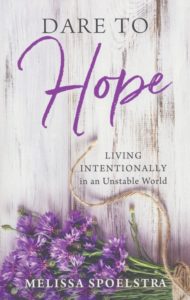 Melissa Spoelstra is an author, speaker, and Bible teacher who is passionate about helping others seek Christ and know Him more intimately. She holds a Bachelor of Arts in Bible Theology and enjoys teaching God’s Word to diverse groups and churches within the body of Christ. Melissa is the author of five Bible studies (Elijah, Numbers, First Corinthians, Joseph, and Jeremiah) and three books (Total Family Makeover, Total Christmas Makeover, and Dare to Hope). She is also a contributor to the Girlfriends in God online devotional, as well as the Proverbs 31 ministries First Five app.
Melissa Spoelstra is an author, speaker, and Bible teacher who is passionate about helping others seek Christ and know Him more intimately. She holds a Bachelor of Arts in Bible Theology and enjoys teaching God’s Word to diverse groups and churches within the body of Christ. Melissa is the author of five Bible studies (Elijah, Numbers, First Corinthians, Joseph, and Jeremiah) and three books (Total Family Makeover, Total Christmas Makeover, and Dare to Hope). She is also a contributor to the Girlfriends in God online devotional, as well as the Proverbs 31 ministries First Five app.
She makes her home in Dublin, Ohio, with her pastor husband and four kids.
God sometimes sends us down an unexpected path, one that ultimately blesses us more than our original plan. Have you ever experienced such a “Divine Detour”?
I didn’t expect to be a pastor’s wife or a Bible study speaker and author. Through many God-orchestrated detours I’ve seen God’s hand of blessing.
When did you first know that you were called to encourage others through your writing and speaking?
As a disciple of Christ, we are all called to encourage others. (1 Thessalonians 5:11) I started writing women’s Bible studies when I studied the book of Numbers and felt God’s conviction in my life regarding complaining and contentment. I wrote my first study specifically for the gals in my own Bible study. Several years later, I found the theme of hope from the book of Jeremiah resonating with me. As I prayed about writing another study, the Lord opened doors for a broader audience for the study of Jeremiah’s book. Since then God has been so gracious to allow me to speak and write studies from God’s Word to encourage women in their faith.
 In Dare to Hope: Living Intentionally in an Unstable World (Abingdon Press, March 2019), you make the comparison between Jeremiah’s life—and our own. How were the days of Jeremiah similar to those in which we live?
In Dare to Hope: Living Intentionally in an Unstable World (Abingdon Press, March 2019), you make the comparison between Jeremiah’s life—and our own. How were the days of Jeremiah similar to those in which we live?
God spoke through His prophet Jeremiah with clarity to a culture summarized by political globalization. The Babylonian Empire brought people of different cultures together. Ancient Judah also faced economic crisis because of their indebtedness to other nations. They had to pay tribute to Egypt, and later Babylon, which left the country stripped of its resources. Even with these economic issues, they struggled against social materialism. Jeremiah said that from the least to the greatest, the people’s lives were ruled by greed. On the religious front, people added other gods to the worship of Yahweh leading to religious pluralism.
Hmmm… sound familiar? Political globalization, economic crisis, social materialism and religious pluralism can all echo into our day, albeit in different ways. Jeremiah’s message brings us back to eternal truths about where our hope lies in troubled times.
[ctt title=”Jeremiah’s message brings us back to eternal truths about where our hope lies in troubled times. ” tweet=”Jeremiah’s message brings us back to eternal truths about where our hope lies in troubled times. (See, Lamentations 3:19-24) https://kathyharrisbooks.com/melissa-spoelstra-dare-to-hope/” coverup=”waicn”]
Did Jeremiah ever lose hope?
Jeremiah was referred to as the weeping prophet because he brought a message that didn’t feel very hopeful. He called the nation of Judah to surrender to Babylon. God used him as a mouthpiece to tell the people how they had gotten off course with counterfeits. His words and illustration were harsh. In response to this, Jeremiah was ostracized from his family. He was imprisoned and beaten. At one point he was lowered into a pit filled with mud. I can’t imagine Jeremiah felt hopeful at the bottom of a pit. He voiced his frustrations and complaints to God even stating that he wished he had died in his mother’s womb. We can relate to Jeremiah’s bouts with depression and discouragement. Yet at the same time, Jeremiah knew where to turn. He poured out his heart to God and rehearsed his attributes. God reassured and encouraged him. Jeremiah chose to dare to hope based on God’s faithfulness rather than the trials he experienced personally as well as those of his nation. He wrote Lamentations and he said this,
“The thought of my suffering and homelessness is bitter beyond words. I will never forget this awful time, as I grieve over my loss. Yet I still dare to hope when I remember this: The faithful love of the Lord never ends! His mercies never cease. Great is his faithfulness; his mercies begin afresh each morning. I say to myself, “The Lord is my inheritance; therefore, I will hope in him!” (Lamentations 3:19-24 NLT)
How do you think we can “live more intentionally” and be more receptive to what God is trying to tell us?
We have so much information coming at us all the time. It comes through speakers and screens, billboards, mailings, and then there is our own self dialogue. This means we must be careful about which voices we allow to be loudest in our lives. By this I mean which voices can carry the most weight. We can’t put Netflix on par with God’s Word. So, this means we need to take time to listen. Listening is different than hearing. Listening takes more intention. In fact, the Hebrew word in the book of Jeremiah is Shama – which means to hear with attention or interest. This isn’t like the television or radio we keep on for background noise. We need focus and quiet to listen. These things are not regular parts of my routine and not commonplace in a world full of phone notifications, social media updates, and background noise a constant. We must battle to choose what is best over just what is most readily available.
You have also written a Bible study about Jeremiah and his message of hope. Why do you feel that message is so important in our current culture?
The message of hope continues to resonate in our culture. We all have reasons for despair and are looking for an anchor of hope to give some stability to our complicated lives. Jeremiah’s message of hope isn’t a formula, but his writings provide greater insight into God’s pathway to a deeper relationship with Him.
God’s message is counterintuitive to the American way of pulling ourselves up by our bootstraps. In the book of Jeremiah, the Lord calls His people to surrender, listen, soften their hearts and take personal responsibility rather than play the blame game. These truths hit home as we muddle through our own circumstances and seek to be daring with hope.
[ctt title=”We must battle to choose what is best over just what is most readily available. ” tweet=”We must battle to choose what is best over just what is most readily available. ~ @melspoelstra (Melissa Spoelstra, Author of Dare to Hope: Living Intentionally in an Unstable World) @abingdonpress https://kathyharrisbooks.com/melissa-spoelstra-dare-to-hope/ via @DivineDetour” coverup=”Aj70X”]
A few fun questions…
When the words aren’t flowing—or when you want to celebrate if they are—what is your favorite comfort food and why?
Chocolate – I especially love Dove milk chocolate and Cadbury Crème Eggs.
What Bible passage or story best describes your journey of faith?
Wow – I definitely couldn’t nail down one passage to describe my journey of faith. One of my favorite passages is Matthew 11:28 – “Then Jesus said, ‘Come to me, all of you who are weary and carry heavy burdens, and I will give you rest.’”
In the story that is your life, are you the strong, female lead; the girl next door; the mysterious woman behind dark glasses; the super heroine; or the little girl trying to walk in high heels?
The girl next door
Thanks, Melissa! It’s great to have you as a guest at Divine Detour.
~ ~ ~
For more information about Melissa, visit her website or follow her on Facebook or Twitter.
To purchase Dare to Hope, log on to: